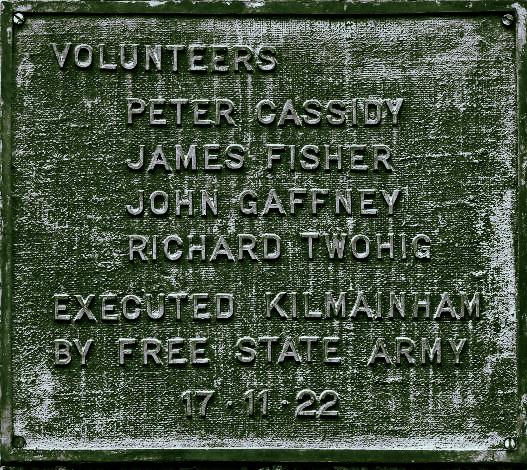Gå frakoblet med Player FM -appen!
90 Irish Civil War Executions
Manage episode 353566786 series 2498459
On this episode of the Irish History Show we looked at executions carried out by the Free State government during the Irish Civil War.
The executions were made possible by legislation known as the Public Safety Bill, which was passed in the Dail on September 27, 1922. The emergency legislation gave to the National Army powers of punishment for anyone ‘taking part in or aiding and abetting attacks on the National Forces’, having possession of arms or explosives ‘without the proper authority’ or disobeying an Army General Order.
Military Courts could impose the sentence of death, imprisonment or penal servitude on those found to be guilty of such offences.
The Provisional Government, which was in place only to enact the Treaty and oversee the handover from the British administration to the Irish Free State, technically had no legal right to enact new legislation without assent of the Governor General, but this post had yet to be filled. Indeed, the Free State itself did not formally exist until December 7, 1922.
So, the Public Safety Bill was technically not a law but simply a resolution passed in the Dáil. It was not until August 1923 that the Free State would pass an Act of Indemnity for all actions committed during the Civil War and also passed new, formal legislation that it would retrospectively legalise what it had enacted in 1922.
John Dorney wrote an article on the executions for the Irish Story which is available here.
We have recently started a Patreon page for The Irish Story website and The Irish History Show. Please follow the link and your support is greatly appreciated. https://www.patreon.com/user?u=29204818
Intro / Outro music “Sliabh” from Aislinn. Licensed under creative commons from the free music archive.
97 episoder
Manage episode 353566786 series 2498459
On this episode of the Irish History Show we looked at executions carried out by the Free State government during the Irish Civil War.
The executions were made possible by legislation known as the Public Safety Bill, which was passed in the Dail on September 27, 1922. The emergency legislation gave to the National Army powers of punishment for anyone ‘taking part in or aiding and abetting attacks on the National Forces’, having possession of arms or explosives ‘without the proper authority’ or disobeying an Army General Order.
Military Courts could impose the sentence of death, imprisonment or penal servitude on those found to be guilty of such offences.
The Provisional Government, which was in place only to enact the Treaty and oversee the handover from the British administration to the Irish Free State, technically had no legal right to enact new legislation without assent of the Governor General, but this post had yet to be filled. Indeed, the Free State itself did not formally exist until December 7, 1922.
So, the Public Safety Bill was technically not a law but simply a resolution passed in the Dáil. It was not until August 1923 that the Free State would pass an Act of Indemnity for all actions committed during the Civil War and also passed new, formal legislation that it would retrospectively legalise what it had enacted in 1922.
John Dorney wrote an article on the executions for the Irish Story which is available here.
We have recently started a Patreon page for The Irish Story website and The Irish History Show. Please follow the link and your support is greatly appreciated. https://www.patreon.com/user?u=29204818
Intro / Outro music “Sliabh” from Aislinn. Licensed under creative commons from the free music archive.
97 episoder
Alle episoder
×Velkommen til Player FM!
Player FM scanner netter for høykvalitets podcaster som du kan nyte nå. Det er den beste podcastappen og fungerer på Android, iPhone og internett. Registrer deg for å synkronisere abonnement på flere enheter.





